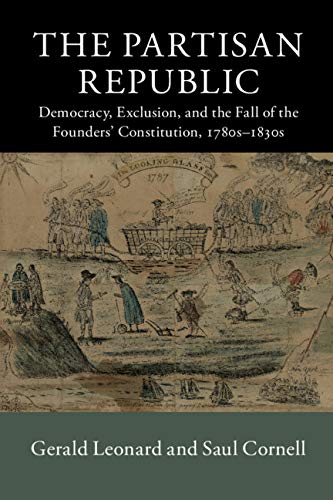All books / Book
The Partisan Republic: Democracy, Exclusion, and the Fall of the Founders' Constitution, 1780s-1830s (New Histories of American Law)

| Full title: | The Partisan Republic: Democracy, Exclusion, and the Fall of the Founders' Constitution, 1780s-1830s (New Histories of American Law) |
|---|---|
| ISBN: | 9781107663893 |
| ISBN 10: | 110766389X |
| Authors: | Leonard, Gerald Cornell, Saul |
| Publisher: | Cambridge University Press |
| Num. pages: | 254 |
| Binding: | Paperback |
| Language: | en |
| Published on: | 2019 |
Read the reviews and/or buy it on Amazon.com
Synopsis
The Partisan Republic Is The First Book To Unite A Top Down And Bottom Up Account Of Constitutional Change In The Founding Era. The Book Focuses On The Decline Of The Founding Generation's Elitist Vision Of The Constitution And The Rise Of A More Democratic Vision Premised On The Exclusion Of Women And Non-whites. It Incorporates Recent Scholarship On Topics Ranging From Judicial Review To Popular Constitutionalism To Place Judicial Initiatives Like Marbury V. Madisonin A Broader, Socio-legal Context. The Book Recognizes The Role Of Constitutional Outsiders As Agents In Shaping The Law, Making Figures Such As The Whiskey Rebels, Judith Sargent Murray, And James Forten Part Of A Cast Of Characters That Has Traditionally Been Limited To White, Male Elites Such As James Madison, Alexander Hamilton, And John Marshall. Finally, It Shows How The Democratic Political Party Came To Supplant The Supreme Court As The Nation's Preeminent Constitutional Institution--,in The More Than 200 Years Since The Ratification Of The United States Constitution, It Has Become Conventional Wisdom That The Supreme Court Has The Last Word On The Meaning Of That Document. At The Same Time, The American People Widely Take For Granted That The Constitution Is A Charter Of Democracy, Liberty, And Equality. Those Who Wrote And Adopted The Constitution, However, Actually Took A Dim View Of Democracy, And Their Notions Of Liberty And Equality Embraced Overt Racial And Gender Discrimination. Moreover, Few Of Them Anticipated That Their New Supreme Court Would Assume The Role Of Final Arbiter Of The Constitution's Meaning. They Did Believe That The Courts Were Essential To The Preservation Of Law And Justice, As Against The Lawless Whims Of Popular Majorities. But They Doubted That The Courts Could Preserve Or Give Meaning To The Constitution Independent Of Other Political Institutions--